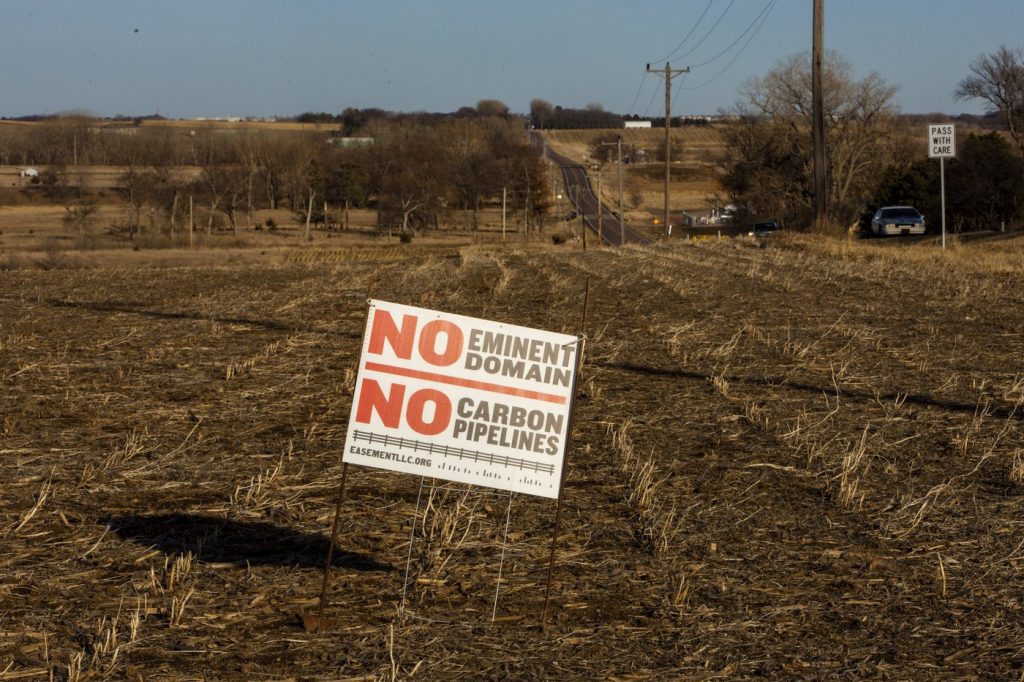MANSFIELD, S.D. (AP) — The proposed carbon dioxide pipeline by Summit Carbon Solutions, aimed at transporting emissions from ethanol plants across five Midwest states for underground storage in North Dakota, has triggered a wave of legal actions against landowners. An analysis conducted by Lee Enterprises and the Associated Press revealed that Summit has filed hundreds of lawsuits, primarily in South Dakota, utilizing eminent domain to secure property access.
Eminent domain allows private property to be acquired for public use, provided the owner is compensated. The litigation has caused significant discontent among farmers, prompting South Dakota Governor Kristi Noem to enact legislation in March 2023 that prohibits the use of eminent domain for constructing carbon dioxide pipelines, casting uncertainty over the project's future.
The analysis uncovered a total of 232 lawsuits filed by Summit against landowners in South Dakota, North Dakota, and Iowa, inclusive of actions seeking property access for surveys. Specifically, all 156 eminent domain lawsuits were initiated in South Dakota alone. A remarkable 83 of these eminent domain lawsuits were filed within just two days in late April 2023. Despite controversy, Summit spokesperson Sabrina Zenor emphasized the company's commitment to voluntary agreements, stating that the "vast majority of easements have been and continue to be" secured through voluntary means.
Summit continued to pursue eminent domain lawsuits until late August 2023. Court records indicated that in seven South Dakota cases, landowners consented to easements post-litigation. However, after the South Dakota Public Utilities Commission rejected Summit's permit application in September 2023, the company decided to "pause or dismiss" its legal actions, as stated by Zenor.
The pipeline project has garnered backing from supporters within the ethanol industry, who view it as a significant economic opportunity. Almost 40% of the United States corn crop is processed into ethanol, commonly blended with gasoline. With the increasing adoption of electric vehicles reducing the demand for ethanol in fuel, proponents are eager to see ethanol used in a burgeoning market for passenger jet fuel. However, existing regulations necessitate that converting ethanol into aviation fuel emits less carbon dioxide to avail tax incentives aimed at reducing greenhouse emissions. Advocates believe that carbon capture projects, such as Summit's pipeline, can serve as an effective strategy to combat climate change while bolstering the ethanol industry.
Summit’s aggressive legal tactics have incited local backlash, particularly in South Dakota, where the litigation against landowners ignited controversy. One significant figure in the opposition, farmer Jared Bossly, faced a long-standing legal battle to prevent Summit from surveying his property in Brown County, South Dakota. As Summit accused him of threatening their surveyors, Bossly publicly refuted the claims. The company successfully conducted a survey on his land by June 20, 2023, leading to the widespread dissemination of photos and videos from the incident, which helped catalyze opposition to the pipeline project.
In 2024, opponents of Summit achieved political victories in South Dakota, with several state lawmakers who supported the pipeline being ousted in primary elections by candidates opposed to both the pipeline and the use of eminent domain. Jim Mehlhaff, the Republican majority leader in the South Dakota Senate, noted that the new composition of the legislature, coupled with the intensifying political pressure from Summit's adversaries, played critical roles in the passage of the new eminent domain law.
Moving forward, the path of Summit's pipeline project in South Dakota remains unclear. Zenor mentioned that while the company is focused on advancing the project in states that "support investment and innovation," Summit continues to believe there remains a viable pathway in South Dakota.










